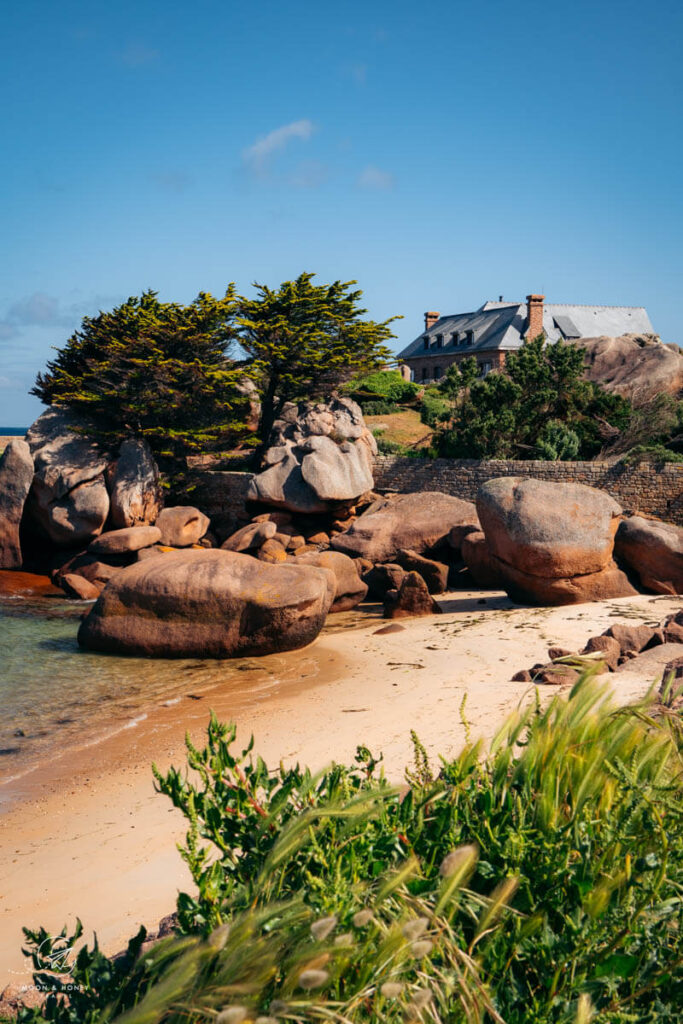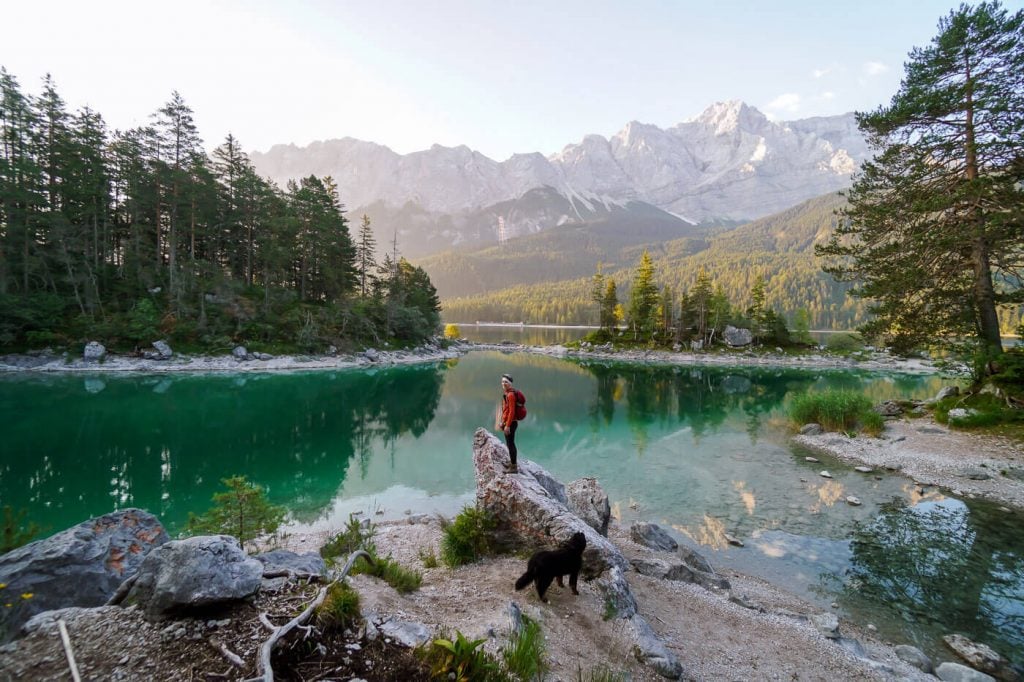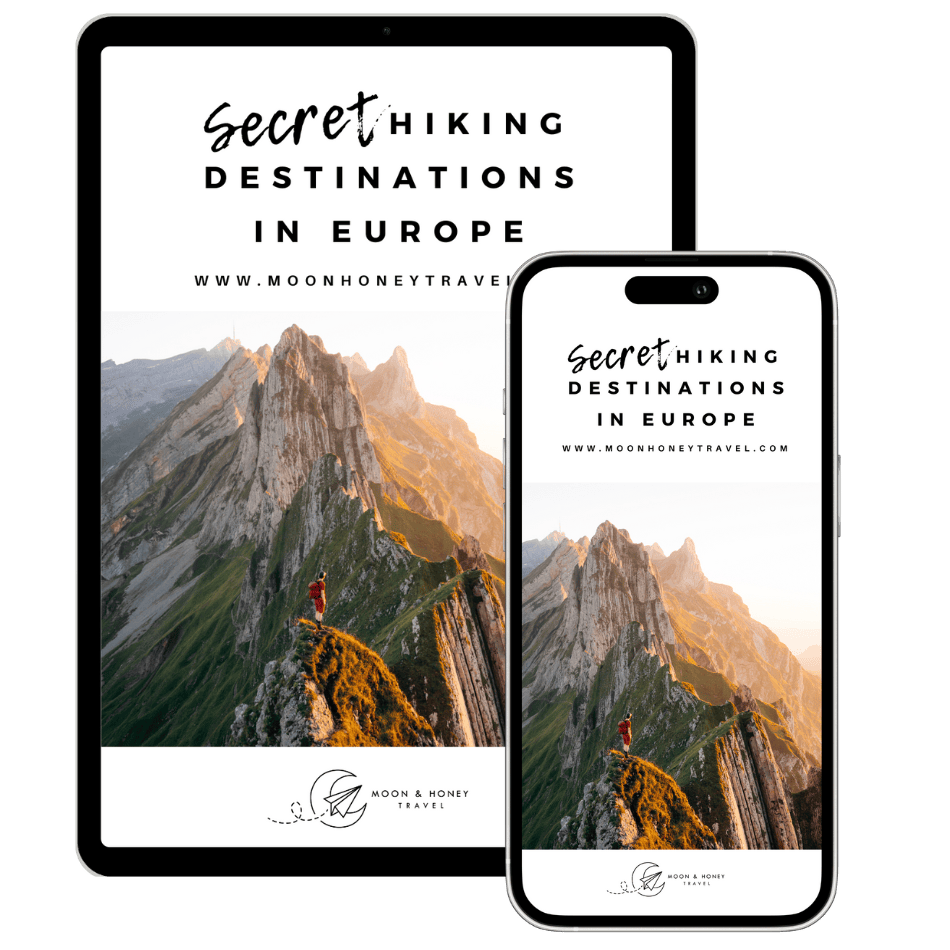For the outdoor traveler, summer is the best season to travel to Europe. This is the season of epic road trips, alpine hiking, boating adventures, hut-to-hut trekking, via ferrata climbing, and so much more.
Summer in Europe commences in June and ends in mid September. In the mountainous regions of Europe, especially the Alps, the start and end of the summer season are dictated by snowfall. For that reason, it’s best to travel to the Alps between July and early September when tackling any high-alpine hikes.
In June, we recommend traveling to Picos de Europa National Park in Northern Spain and Brittany in Northern France.
Between July and September, visit the European Alps, the Dinaric Alps, the British Isles, Scandinavia, and the North Atlantic.
In late September, the weather generally starts to turn, ushering in the start of autumn.
This guide to the best places to visit in Europe in summer highlights our favorite destinations for authentic, outdoor-inspired travel. Follow our recommendations to steer clear of overhyped and overcrowded destinations.
Summer travel in Europe needn’t be fraught with frustrating lines, heavy crowds, high temperatures, and mediocre experiences. It can be the most magical time of year for those willing to step off the tired, city trail and embrace the great outdoors.
If you’re interested in traveling to Portugal, Mallorca, Malta, or other Mediterranean and Southern European destinations, we urge you to visit in spring (April – May), or autumn (late September – October), when temperatures are cooler.

- When is Summer in Europe: June – mid-September
- Summer Europe Road Trips: Picos de Europa Road Trip (Northern Spain), Faroe Islands Road Trip (North Atlantic), Bavarian Alps Road Trip (Germany), Austria Road Trip (Alps), Slovenia Road Trip (Alps)
- Rental Car: We recommend using the Discovercars.com car rental platform to search for and book car rentals in Europe.
- Top Summer Destinations without a Car: (1) Appenzell, Switzerland; (2) Ortisei, Dolomites, Italy; (3) Garmisch-Partenkirchen in Germany; (4) Lech am Arlberg in Austria
- World-Famous Summer Trekking Adventures: Tour du Mont Blanc and the Alta Via 1
- Secret Summer Hut-to-Hut Hiking Adventures: Liechtenstein Panorama Trail in Liechtenstein and the Schladminger Tauern High Trail in Austria
1. Brittany, Northern France

Brittany (Bretagne in French, Breizh in Breton) is a region in Northern France that has been shaped and defined by its relationship and proximity to the sea. It’s a Celtic Nation with its own identity, language, music, and cuisine.
Any trip to the land of crêperies and mariner shirts will likely be inspired by the windswept Breton Coast that measures an extraordinary 2730 kilometers.
Brittany’s vast coastline alternates between rugged gorse-covered cliffs, sandy crescent beaches, and granite-studded bays. Somehow the region’s natural beauty is augmented by the presence of towering lighthouses, ancient megalithic alignments, medieval castles, and fortified port towns. If that sounds romantic, rest assured, it is.
An essential way to experience the Breton coast is by walking sections of the GR 34 Customs Officers Path (Sentier des Douaniers), which traces almost the entire coast of Brittany.
Whether you set out to trek a chunk of the GR 34, or sample stretches of the long-distance coastal trail on various walks, you’ll be following in the footsteps of customs officers, who were patrolling the coast in order to combat smuggling in the 18th and 19th centuries.
We particularly loved walking the GR 34 between Cap Frehel and Fort La Latte, the Pink Granite Coast, around Pointe de Pen Hir in the Crozon Peninsula, Térénez to Saint-Samson in the Bay of Morlaix, and the wild coast of Quiberon.
This French region offers travelers a rare opportunity to experience a European destination that hasn’t been impacted by mass tourism.
Come in June, or September, to experience the quieter months of the holiday season. Lovers of Celtic Music, may want to time their trip with an annual celtic festival like Festival Interceltique de Lorient (August), or Festival Le Cornouaille in Quimper (July).
Here’s how we planned a 10-Day Trip to Brittany.
Where to Stay in Brittany
- Hôtel de Diane in Sables d’Or Les Pins for exploring the Emerald Coast
- Hôtel Les Costans, or Spa L’Agapa for exploring the Pink Granite Coast
- Hôtel Le Grand Large Belle-île-en-mer for exploring Belle Ile Island
2. Picos de Europa, Northern Spain

Picos de Europa National Park spans the regions of Asturias, Cantabria, and León in Northern Spain. It comprises the three towering massifs of the Picos de Europa Mountains, crowned by the lofty peak of Torre Cerredo at 2650 meters.
Within this rugged limestone expanse, lunar-like alpine vistas intertwine with lush mixed forests and deep gorges. The scenery is majestic and awe-inspiring.
We relished every moment of our Picos de Europa Road Trip, in which we encircled the mountain range, dividing our time between Poncebos, Potes, and Cangas de Onís.
Highlights of our trip included the Ruta del Cares gorge and this 2-Day Refugio Jou de los Cabrones Hike.
Though a trip to Picos de Europa is undoubtedly centered around hiking in the mountains, there are some significant religious buildings in the area including the Covadonga Sanctuary and the Santo Toribio de Liébana Monastery.
Where to Stay in Picos de Europa
- Villa Elena in Potes, or Apartamentos La Ventana de Mogrovejo in Camaleño Valley for hiking around Fuente Dé in the central massif.
- Hotel Ecos del Sella, or Hotel Mirador de la Cepada in Cangas de Onís for visiting the Covadonga Lakes and Sanctuary
- Arcea Hotel Mirador de Cabrales, or Hostal Poncebos in Poncebos for hiking Ruta del Cares
Learn More: Where to Stay in Picos de Europa
3. Dinaric Alps, Montenegro

Montenegro is a Balkan country that’s blessed with not only a stunning coastline, but also several striking limestone mountain ranges, all of which form part of the greater Dinaric Alps.
You can experience all the wonders of Montenegro if you follow our 2-Week Montenegro Road Trip, which connects the Komovi mountains with Prokletije National Park, Durmitor National Park, Kotor, the Budva Riviera, and Ulcinj.
For summer hiking, head to Žabljak, the gateway to Durmitor National Park. Intrepid travelers shouldn’t skip Grebaje Valley, arguably the most stunning gateway to Prokletije National Park, aka the Accursed Mountains.
Where to Stay in the Mountains of Montenegro
- Casa di Pino Eco Lodge Apartments in Žabljak
4. Austrian Alps, Austria

I always thought that Austria was terrible at marketing. But, the longer I live here, the more I believe that Austrians don’t want to be on the trendy tourist map. They have no desire to print out English menus (rightfully so) and turn all their treasures into cheap caricatures of what they once were.
Conservative and rigid, Austrians hold true to their old values and resist change. For the traveler, this is actually a wonderful thing. You can authentically come into contact with a culture that feels no need to perform, oblige, or seduce.
Believe it or not, I think Austria is the best destination for peak summer season travel in Europe.
In July and August, you can escape to an Austrian alpine village and live out a merry few days, or weeks, hiking in the Alps, eating in mountain huts, and forgetting about the world’s many tragedies.
Follow our 2-Week Austria Road Trip, or 1-Week Austria Road Trip for an introduction to the Austrian Alps. These itineraries have been reworked year after year to reflect our favorite places and experiences.
Though a car provides greater flexibility and ease, it’s not essential. Car-free travelers can base themselves in Lech am Arlberg, Schladming, Lake Achensee, Mayrhofen, and even Innsbruck. Read Where to Stay in Austria for a summary of our favorite summer destinations.
Multi-day hikers ought to know that Austria is also a premier destination for hut-to-hut hiking in Europe. Read our guide to Best Treks in Austria for trail inspiration.
You can also save yourself some time and energy by booking one of these self-guided hiking trips: 6-Day Hut to Hut Light in the Austrian Alps (child friendly), 8-Day Austria Culinary Delight Hut Hiking Tour, and 3-Day Austria Culinary Delight Extended Weekend Hiking.
Where to Stay in the Austrian Alps
- Hotel Goldener Hirsch, or Hotel Goldgasse in Salzburg
- Altstadthotel Weisses Kreuz, or Weisses Rössl in Innsbruck
- ElisabethHotel Premium Private Retreat- Adults only, or ZillergrundRock Luxury Mountain Resort in Mayrhofen
- Hotel Arlberg in Lech am Arlberg
- Amrai Suites in Schruns, Montafon Valley
- JOHANN Schladming in Schladming
5. Slovenian Alps, Slovenia

For better or for worse, Slovenia is far better at marketing than its neighbor to the north. Even so, most people will gravitate to the Julian Alps, overlooking the quiet Karawanks and the majestic Kamnik-Savinja Alps.
We recommend exploring the Kamnik-Savinja Alps and its picture-perfect glacial valleys by following this 5-Day Slovenia Road Trip.
Expert alpine hikers can traverse the range by following this 4-Day Kamnik-Savinja Alps Hut-to-Hut Hike.
For an equally adventurous but less challenging trek, check out our Triglav National Park Traverse across the Julian Alps. We recommend booking this self-guided Crossing the Julian Alps trek with Slotrips, which has countless advantages.
Solo travelers and less-experienced hikers love these small group tours: Best Walks in Slovenia, Discover the Slovenian Alps, and Best of the Julian Alps Hut-to-Hut.
And for those that want to see all the wonders of Slovenia including the seaside town of Piran, Lake Bled, Ljubljana, the Soca Valley, the Seven Lakes Valley, and Lake Bohinj, follow our 2-Week Slovenia Road Trip.
Where to Stay in the Slovenian Alps
- Boutique Hotel Milka in Kranjska Gora or Triangel Boutique Hotel in Gozd Martuljek for touring the Northern Julian Alps
- Boutique hotel Vila Planinka in Zgornje Jezersko for exploring the Kamnik-Savinja Alps
- Hotel Bohinj, or Hotel Majerca at Lake Bohinj
- Vila Bled at Lake Bled
6. Faroe Islands

The Faroe Islands, born from volcanic eruptions and sculpted by glaciers during the ice age, form a distinctive puzzle-shaped archipelago in the North Atlantic between Norway and Iceland.
A trip to the 18-island archipelago offers full-immersion in a tapestry of raw and elemental Nordic landscapes. Here, treeless, skeletal islands rise in pyramids over colorful fishing villages and sheltered harbors. Lakes appear to be floating. And, puffins nest in sea cliffs, misted by nearby waterfalls.
With its mythical landscapes, the Faroe Islands seem like the figment of the imagination. Even after visiting, our trip seems surreal. Truthfully, it’s the European destination that I’m most eager to revisit in summer.
Planning a visit to the Faroe Islands can initially seem daunting. Our Faroe Island Road Trip and Faroe Islands Hiking Guide will demystify the trip planning process and save you a lot of time.
There are direct flights to the Faroe Islands from Copenhagen (Denmark), Oslo (Norway), Reykjavik (Iceland), London (England), Edinburgh (Scotland), Paris (France), and Barcelona (Spain). Some of these routes are seasonal.
Where to Stay in the Faroe Islands
- Hilton Garden Inn Faroe Islands, Hotel Brandan, Havgrím Seaside Hotel 1948, or Hotel Føroyar in Tórshavn
- Gjaargardur Guesthouse Gjogv in Gjogv
- The View in Bøur
7. Iceland

The best time to visit Iceland is in summer. While we’re huge advocates for shoulder-season travel, Iceland is best toured in summer when all destinations are accessible and the weather is more stable.
Summer travelers can visit the highlands (interior), the westfjords, and Westman Islands, destinations which are mostly unreachable the rest of the year.
We visited Iceland in April, which was unforgettable, but not without constraints and limitations.
The foundation of any Iceland trip is the ring road, a 1322 km-long road which loops around the entire island. Our 2-Week Iceland Road Trip highlights the diverse landscapes and destinations across Iceland.
8. Appenzell, Swiss Alps, Switzerland

Appenzell (Appenzellerland in German) is a region in northeastern Switzerland made-up of two cantons: Appenzell Ausserrhoden and Appenzell Innerrhoden.
The majestic Alpstein massif forms the backdrop of this idyllic region of rolling green meadows spangled with colorful farmsteads.
The Alpstein mountains’ appeal lies not in its height, but in its unique, chiseled shapes that rise up in surprising processions of limestone columns, ridges, and plateaus.
Between the folding mountains, alpine dairy farms continue to produce cheese. You may have heard of Appenzeller Käse, a pungent and herbaceous mountain cheese that’s celebrated across Europe. When you’re out and about, always carve out time to eat local dishes made with regional speciality in the various mountain huts like Berggasthaus Aescher.
The Appenzell Alps are heart-stirring. And, luckily, a car is not needed to explore this range of the Swiss Alps. Stay in the town of Appenzell, which has direct train connections to all the significant trailheads.
Read Best Hikes in Appenzell for a summary of our favorite hikes including Marwees Ridge Trail, Hoher Kasten to Saxer Lücke, and the 3-Day Alpstein High Trail.
Where to Stay in Appenzell Village
9. Garmisch-Partenkirchen, Bavarian Alps, Germany

Nestled amidst the Ammergau Alps, Ester Mountains, and Wetterstein Mountains, Garmisch-Partenkirchen stands as a picturesque alpine resort town in Upper Bavaria, Germany, a mere 1-hour journey from Munich by train, or car.
Garmisch-Partenkirchen’s allure is heightened by natural wonders such as the mystical Partnachklamm gorge, the rugged Höllentalklamm gorge, and the enchanting Eibsee Lake.
Moreover, Garmisch-Partenkirchen serves as an ideal gateway to explore the Bavarian Alps’ most renowned attractions, including the charming towns of Oberammergau and Mittenwald as well as the fairytale castles of Neuschwanstein and Linderhof.
Plan your trip to Garmisch with these guides: Best Things to Do in Garmisch-Partenkirchen and Hiking in Garmisch-Partenkirchen.
If you’re entertaining the idea of a road trip, take a close look at our 10-Day Bavarian Alps and Tyrolean Alps Road Trip.
Where to Stay in Garmisch-Partenkirchen
- Boutiquehotel Werdenfelserei in the town center
- Eibsee-Hotel at Lake Eibsee in nearby Grainau
- Das Graseck mountainside hotel
10. The Dolomites, Italian Alps, Italy

What is summer without a trip to the Dolomites? Miserable, dreary, and utterly depressing.
Falling in love with the Dolomites is inevitable. There’s no other natural reaction to witnessing one of the most spellbinding mountain ranges in the world.
While I could emote and write at length about this very special corner of the Italian Alps, it’s unnecessary, as I’ve already written well over 80 articles about the Italian Dolomites. Start here:
Best Base | Where to Stay in the Dolomites in Summer
Hotels | Best Hotels in the Dolomites, Best Hotels in Val Gardena, and Best Hotels in Alta Badia
Hiking | Best Day Hikes in the Dolomites and Hut to Hut Hiking in the Dolomites
What to See and Do | Best Places to Visit in the Dolomites and Best Things to Do in the Dolomites
Traveling without a Car | Visiting the Dolomites Without a Car
Travel Itineraries | 5-Day Dolomites Road Trip, 7-Day Dolomites Road Trip, and 10-14 Day Dolomites Road Trip
Arrival | How to Get to the Dolomites
More Europe Travel Guides
Seasonal Guides:
- Alps in Summer
- Autumn in Europe: Top Destinations
- Spring in Europe: Top Destinations
- Winter in Europe: Top Places to Visit
Europe Travel:
Hiking in Europe:
- Best Treks in Europe: Multi-Day Hiking Adventures
- Best Day Hikes in Europe
- Tips for Hiking in the Alps
- Best Hikes in the Alps

Pin this Image for Future Trip Planning!
Stay Connected:
Connect with us on Pinterest.
Follow us on Instagram.
Like us on Facebook.
Support Us:
If you love reading our content, you can buy us a coffee via Ko-Fi.



